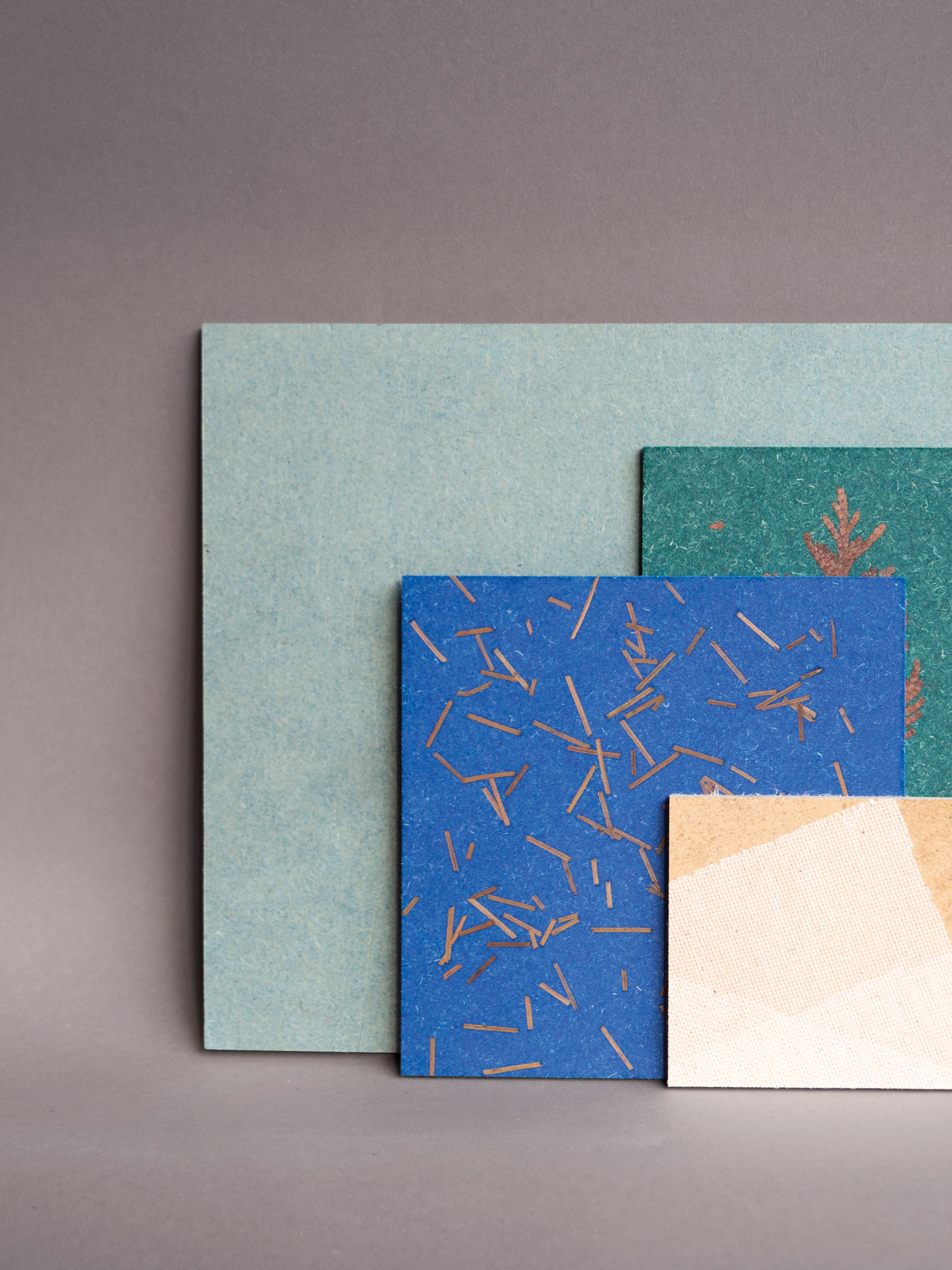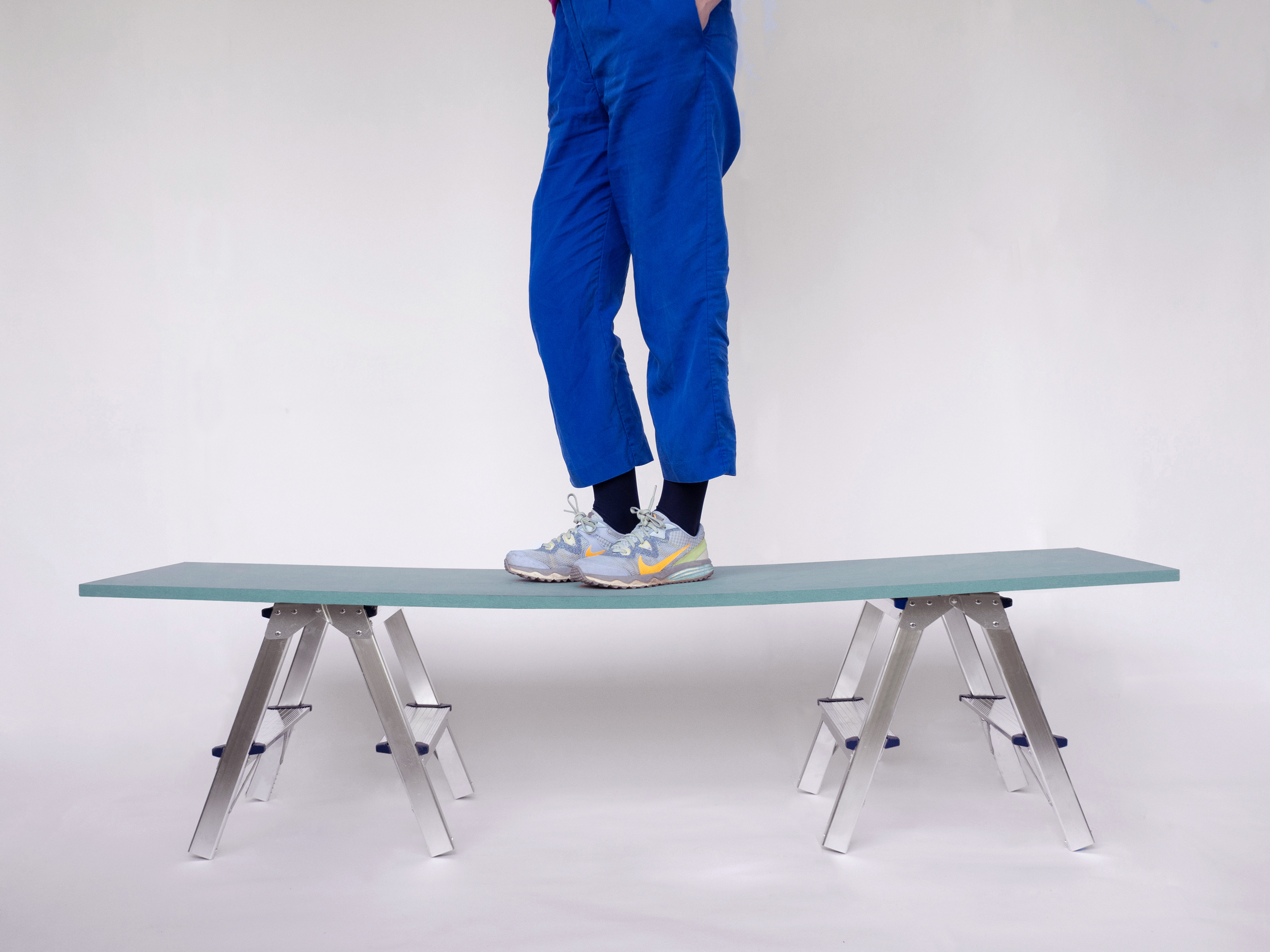BRAUNSCHWEIG, Germany
,
March 23, 2022
(press release)
–
With support from the Fraunhofer WKI, designer Sofia Souidi has developed wood-based panels made from wood fibers and casein. Casein is a formaldehyde-free binder that was already being used as an adhesive many centuries ago. Mixed-in color pigments and granulates combined with 3D moldability enable a diverse range of design possibilities. The material consists of recycled components and is itself recyclable. © Studio Sofia Souidi Whether monochrome, marbled, with graphic elements or terrazzo-like structures - Superwood offers a multitude of design options. © Studio Sofia Souidi Superwood can be pressed to form panels and molded parts - Sofia Souidi tests its flexibility and load-bearing capacity. For the production of shelves, cupboards and other items of furniture, medium-density fiberboards (MDF) are often utilized, as they possess advantageous properties. In the event of fluctuations in temperature and humidity in the room, they hardly warp at all. Thanks to their homogeneous structure, they can be very easily bonded to form furniture items and are simple to paint. In a research project by designer Sofia Souidi in collaboration with the Fraunhofer WKI, wood-fiber panels were developed that exhibit the advantages of MDF but which can be manufactured without petrochemical binders. Consequently, the newly developed wood-fiber panels do not emit any additional health-critical formaldehyde. The project team used glue made from casein (milk protein), which was already being used in ancient Egypt as an adhesive for furniture and boat construction. Due to strict hygiene regulations, approximately two million liters of milk are discarded in Germany every year. Casein can be extracted from this milk. As a result, the casein binder can be produced from an existing waste product - without food competition. “In collaboration with the designer Sofia Souidi, we have developed a high-performance, formaldehyde-free binder on the basis of casein. In conjunction with wood fibers, a material results that can be processed in the same way as MDF – we call it Superwood. It can be pressed to form panels as well as molded parts and is therefore suitable for use in furniture production and architecture”, reported Dr. Steffen Sydow, Project Leader at the Fraunhofer WKI. Designer Sofia Souidi added: “It would be conceivable to produce panels from our material that, like plasterboard, could be utilized in a versatile and uncomplicated way in interior construction.” One goal of the collaboration between the designer and the researcher was to use recycled wood fibers from waste wood in order to develop a material that is itself fully recyclable. Furthermore, the admixture of differently colored forest and production waste was experimented with. As a result, a multitude of design variants can be created that visually convey the concept of recycling. In the first phase of the project, research concentrated on the composition and optimization of the material on a small industrial scale. Promising results were achieved here, which were subsequently transferred to the industrial scale in a second project phase. “For me, the collaboration with the Fraunhofer WKI was particularly profitable with regard to the transfer of the manufacturing process to industrial scale. In my workshop, I had previously reached the limits of feasibility. The technical possibilities in the Fraunhofer WKI technical center have brought my previous experiments to the next level. Furthermore, during our collaboration, we found that the interlocking of science and design yields benefits for both sides. Design-specific knowledge and the attitude that iterative design processes generate relevant and aesthetic results found the ideal complement in the scientific expertise at the Fraunhofer WKI”, said designer Sofia Souidi in her description of the cooperation. From an ecological point of view, it makes fundamental sense to recycle products made from wood or wood-based materials instead of burning them or disposing of them in landfills after the initial use phase. As a result, the recycling process and the recyclability of wood-based materials are gaining in importance. Ms. Souidi and Dr. Sydow have created a recycling concept for the recovery of Superwood material after the end of its useful life. With Superwood, the wood-based materials industry, as well as companies in the sectors of furniture manufacture, interior design, exhibition construction and event organization, are provided with the opportunity to comply with increasingly stringent requirements in terms of sustainability and formaldehyde emissions. The diverse design possibilities offered by the material enable it to be used in new business areas. Wood as an alternative to concrete is currently becoming increasingly attractive in architecture. Superwood could be deployed as a versatile customizable alternative to plasterboard and hence be of interest for interior design, for example in tiny houses, in which large quantities of material are re-purposed. The material would also be an exciting alternative in vehicles, for example in the interiors of mobile homes and caravans, as a result of its 3D formability. Last modified: The first phase of the project, from July 2019 to August 2021, was funded by the Fraunhofer Network “Science, Art and Design” within the framework of a “Fraunhofer residency”. Through its work, the Fraunhofer Network provides a contribution towards the promotion of interdisciplinary discourse between applied research, art and design. The second project phase, from September 2021 to August 2022, is being funded by the IKEA Foundation. Sustainability through the utilization of renewable raw materials has formed the focus at the Fraunhofer WKI for 75 years. The institute, with locations in Braunschweig, Hanover and Wolfsburg, specializes in process engineering, natural-fiber composites, binders and coatings, wood and emission protection, quality assurance of wood products, material and product testing, recycling procedures and the utilization of organic building materials and wood in construction. Virtually all the procedures and materials resulting from the research activities are applied industrially.Funding
The background of the Fraunhofer WKI
* All content is copyrighted by Industry Intelligence, or the original respective author or source. You may not recirculate, redistrubte or publish the analysis and presentation included in the service without Industry Intelligence's prior written consent. Please review our terms of use.






